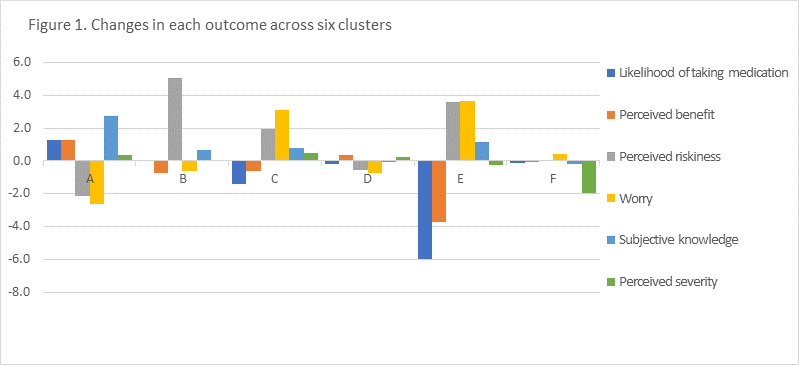Session Information
Date: Tuesday, October 23, 2018
Title: Patient Outcomes, Preferences, and Attitudes Poster II: Patient Perspectives
Session Type: ACR Poster Session C
Session Time: 9:00AM-11:00AM
Background/Purpose: Testimonials have been shown to have a strong influence on patients¡¯ decision-making. Patients are increasingly accessing the Internet as a source of medical information. In this study, we sought to examine whether people differ in the way they react to online treatment testimonials.
Methods: We administered a survey to Mechanical Turk workers (¡Ý 50 years old). Participants¡¯ received information describing outcomes for an osteoporosis medication. Participant¡¯ likelihood to take medication, subjective knowledge, perceived benefit, riskiness, and worry related to the medication and perceived severity of osteoporosis were measured on 11-point numeric rating scales before and after reading the description of the medication. We classified participants who accessed at least one online testimonial into different groups using cluster analysis based on the changes in the six listed outcomes. We used ANOVA and Chi-square tests to compare demographic characteristics across the clusters.
Results: 322 participants read one or more online testimonials. The mean (SD) age was 59 (7), and the majority were female (61%), white (73%) and college graduates (67%). Six clusters were identified based on the changes in six outcomes. 64 participants (Cluster A) reacted positively to the testimonials (i.e., more likely to take medication, improved subjective knowledge, the greater perceived benefit of medication, and less perceived riskiness and worry about the medication). Nineteen participants (Cluster E) surprisingly had more misunderstanding of disease then made suboptimal decisions after the intervention. Meanwhile, the intervention changed participants¡¯ risk perception (Clusters B, D, F) differently, but had a very limited influence on their likelihood to take medication.
We found a statistical difference in ethnicity(p<0.01) and numerical level(p=0.02) across six clusters. Higher numeracy level is positively associated with the better perception of disease and treatment.
Conclusion: Participants reacted drastically different to online testimonials. Only a small proportion of participants benefits significantly from online testimonials, which tend to be high numerates.
Table1. Description of the sample according to the clusters of participants
|
Cluster |
A |
B |
C |
D |
E |
F |
p-Value |
|
N |
64 |
14 |
62 |
119 |
19 |
44 |
|
|
Age |
59.7 |
60.0 |
58.8 |
59.8 |
60.4 |
57.5 |
0.44 |
|
Male |
45.3% |
42.9% |
33.9% |
36.1% |
21.1% |
50.0% |
0.22 |
|
College graduate or higher |
71.9% |
71.4% |
67.7% |
67.2% |
57.9% |
61.4% |
0.82 |
|
Race-White |
79.7% |
71.4% |
61.3% |
83.2% |
84.2% |
50.0% |
<0.01 |
|
Numeracy level- High |
46.9% |
28.6% |
30.6% |
32.8% |
31.6% |
13.6% |
0.02 |
|
Family history of lower bone density/osteoporosis |
29.7% |
21.4% |
30.6% |
35.3% |
15.8% |
34.1% |
0.57 |
|
Medical history of bone fracture |
6.3% |
14.3% |
9.7% |
12.6% |
5.3% |
20.5% |
0.27 |
|
Taking Rx medication regularly |
53.1% |
50.0% |
56.5% |
51.3% |
52.6% |
52.3% |
0.99 |
|
|
|||||||
|
Average rating of accessed reviews |
3.4 |
2.7 |
3.3 |
3.3 |
3.1 |
3.5 |
0.05 |
|
Number of accessed positive review |
10.7 |
8.1 |
9.1 |
8.7 |
6.0 |
7.6 |
0.53 |
|
Number of accessed negative review |
4.3 |
3.6 |
3.8 |
3.5 |
4.2 |
2.6 |
0.06 |
To cite this abstract in AMA style:
Jiang C, Fraenkel L. Reactions to Online Testimonials: A Cluster Analysis of Risk Perception and Decision Making [abstract]. Arthritis Rheumatol. 2018; 70 (suppl 9). https://acrabstracts.org/abstract/reactions-to-online-testimonials-a-cluster-analysis-of-risk-perception-and-decision-making/. Accessed .« Back to 2018 ACR/ARHP Annual Meeting
ACR Meeting Abstracts - https://acrabstracts.org/abstract/reactions-to-online-testimonials-a-cluster-analysis-of-risk-perception-and-decision-making/

